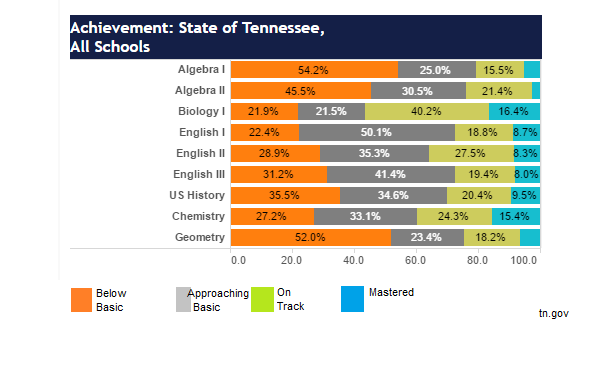Schools in Tennessee are getting ready for spring testing starting mid-April, hoping to leave behind the debacle of last year, when glitches in carrying out revamped tests caused headaches across the state.
Hitting reset again this year potentially creates more hurdles in getting an accurate read on student achievement at a time when the data that is available shows low student performance, even as state officials are touting high graduation rates.
The Tennessee Department of Education terminated its contract with Measurement Inc. last year after technical problems ground an initial round of online testing in February to a halt and the company then missed deadlines to deliver paper and pencil tests for spring. This year, the state has a contract with a new vendor, Questar, for the second year of TNReady testing that is part of the Tennessee Comprehensive Assessment Program (TCAP), begun in 1988.
Testing was canceled last spring for students in grades 3-8 because of the mishaps, but high school students were able to take the full assessment. Many students scored below expectations, but state officials say the scores reflect changes in standards and types of test questions and new achievement levels.
“Just as we expected proficiency to dip in this first year of our new assessment aligned to higher academic standards, we also expect that scores will improve over time as we support all students in their growth to meet these higher expectations,” reads a summary of the results in a report available online. The report says the scores could not be compared to previous years’ results because of the changes.
The results from testing last spring show that 53 percent of high school students are below expectations in math, 35.5 percent are below expectations in U.S. history, 27.3 percent are below expectations in English and 24.4 percent are below basic in science. The science test was more similar to previous assessments.
Audrey Shores, chief operating officer for Professional Educators of Tennessee, said there may be some of the same validity issues this year as last year because of switching to a new vendor, the result being that scores “won’t be useful for the purposes they’re intended.”
This spring, the state assessment for grades 3-8 will be given with paper and pencil. There is an online option for high school End of Course (EOC) exams depending on platform readiness and whether schools are well equipped for online testing. Even if schools demonstrate an ability for success with online testing, districts still have the option of using paper and pencil tests.
The goal is to eventually phase in more online testing over multiple years as more schools become ready to administer testing online. But at this point that’s a big question mark, said Shores. Large school districts with modern technology can still have problems because of servers not being able to handle large numbers of students testing simultaneously. Rural districts, meanwhile, face ongoing issues with dated equipment. “There are a lot of schools just not set up for online testing,” she said.
In response to concerns about testing fatigue, the state eliminated testing in February and restructured testing for spring to make it better fit within the school day.
Tennessee has been under pressure to improve student performance since 2007 when the U.S. Chamber of Commerce gave the state two Fs. One F was in a category called Truth in Advertising and pertained to comparing proficiency on state and national assessments. The other F was in the category of Postsecondary and Workforce Readiness.
Even as test results from last year tentatively point to low student achievement, the state proudly announced in October a graduation rate of 88.5 percent for 2015-2016.
“Our schools and districts should be proud of the work they have done to support students on their journeys to and beyond high school graduation,” Education Commissioner Candice McQueen said in a news release at the time. “High school graduation is a critical step in allowing students to embark on their chosen paths in life. However, as more Tennessee students are earning their diplomas, we must ensure that they are all leaving with the knowledge and skills to be successful in college and in the workforce.”









[…] problems come a year after a much larger debacle prompted the state Department of Education to find a new testing vendor, and is the fourth year in […]
[…] across the state are engaged in TNReady testing this month, trying to leave behind the problems of last year when procedural glitches forced the […]
I am curious as to how the 88.5% graduation rate was computed. But even more curious about how many of the graduates that chose to attend college required remedial classes.